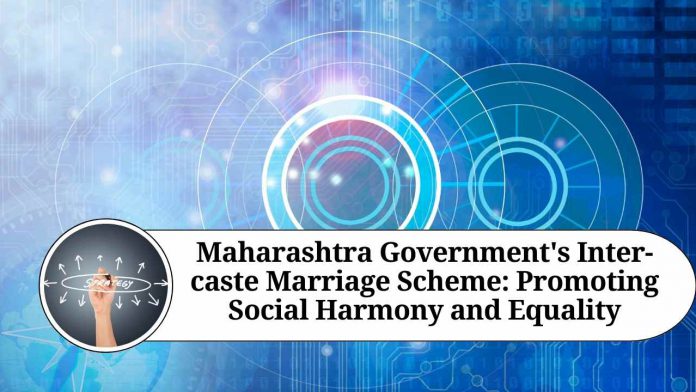Introduction
In a diverse country like India, the practice of inter-caste marriages has long been a sensitive topic due to deep-rooted social norms and cultural traditions. However, recognizing the importance of promoting social harmony and equality, the Maharashtra government has implemented a progressive scheme to encourage inter-caste marriages in the state. This bold initiative aims to break down barriers, foster inclusivity, and pave the way for a more unified society. In this blog, we will delve into the details of the inter-caste marriage government scheme in Maharashtra and explore its significance in the quest for social progress.
The Inter-caste Marriage Government Scheme
The inter-caste marriage government scheme, officially known as the “Dr. Babasaheb Ambedkar Inter-caste Marriage Scheme,” was launched by the Maharashtra government with the objective of encouraging individuals from different castes to come together and establish marital alliances. The scheme is named after Dr. Babasaheb Ambedkar, a social reformer and architect of the Indian Constitution, who vehemently fought against caste discrimination.
Key Features and Benefits
- Financial Assistance: One of the key provisions of the scheme is the provision of financial assistance to eligible couples. The government provides a financial aid of up to INR 2.5 lakh (subject to conditions) to inter-caste couples to support their wedding expenses and post-marriage expenses, such as starting a new household.
- Legal and Social Support: The scheme also offers legal and social support to couples facing opposition or social stigma due to their inter-caste marriage. It includes the provision of counseling services and assistance in dealing with legal hurdles, if any.
- Awareness Programs: The Maharashtra government actively conducts awareness programs to educate individuals about the benefits of inter-caste marriages. These programs aim to debunk myths, challenge stereotypes, and promote a more inclusive mindset among people.
- Empowering Women: The scheme places a strong emphasis on empowering women. It encourages women from marginalized communities to choose their life partners without fear of social backlash, thereby promoting gender equality and women’s agency.
Significance and Impact
The inter-caste marriage government scheme in Maharashtra holds immense significance in several ways:
- Social Progress: By promoting inter-caste marriages, the government aims to break down the rigid walls of caste-based discrimination and foster a more egalitarian society. It challenges the regressive social norms that perpetuate caste divisions and encourages a more inclusive and harmonious community.
- Unity in Diversity: India is known for its rich diversity, and inter-caste marriages can further strengthen the fabric of this diverse nation. Such unions bridge gaps between communities, promote cultural exchange, and nurture a sense of unity in diversity.
- Eradicating Prejudices: Inter-caste marriages challenge the deep-rooted prejudices associated with caste discrimination. When individuals from different castes come together, they demonstrate that love and compatibility are not determined by caste but by shared values and understanding.
- Empowering Marginalized Communities: The scheme provides financial aid and support to couples from marginalized communities, helping them overcome social and economic barriers. It promotes inclusivity and empowers individuals to break free from the constraints imposed by caste-based discrimination.
Conclusion
The inter-caste marriage government scheme in Maharashtra stands as a progressive step towards social progress and equality. By incentivizing and supporting inter-caste marriages, the government aims to dismantle the rigid caste hierarchy and promote inclusivity, unity, and harmony in society. This scheme not only empowers individuals to choose their life partners freely but also challenges age-old prejudices that hinder the growth and development of a diverse nation like India. As more states in India consider similar initiatives, the hope for a society free from caste-based discrimination continues to gain momentum.
Read more useful content:
Frequently Asked Questions (FAQs)
Q1: Who is eligible to avail of the inter-caste marriage government scheme in Maharashtra?
A1: Any couple where either the bride or groom belongs to a Scheduled Caste (SC) and the other partner belongs to a non-SC caste is eligible to avail of the scheme.
Q2: How much financial assistance is provided under the scheme?
A2: The scheme provides financial assistance of up to INR 2.5 lakh to eligible couples. The exact amount is subject to conditions and may vary based on individual circumstances.
Q3: How can couples apply for the inter-caste marriage scheme in Maharashtra?
A3: Couples can apply for the scheme by filling out the application form available on the official website of the Maharashtra government or by visiting the nearest Social Justice and Special Assistance office.
Q4: What kind of legal support is provided to couples facing opposition or challenges due to their inter-caste marriage?
A4: The scheme offers legal support by providing counseling services and assisting couples in dealing with any legal hurdles they may encounter. This support aims to help couples overcome challenges and address any issues arising from their inter-caste marriage.
Q5: Are there any conditions or criteria that need to be fulfilled to avail of the scheme?
A5: Yes, there are certain conditions that need to be fulfilled. The couple should be residents of Maharashtra, and their marriage should be registered under the Hindu Marriage Act, 1955. The bride’s age should be 18 years or above, and the groom’s age should be 21 years or above.
Q6: Is there any income criterion to be eligible for the financial assistance?
A6: Yes, there is an income criterion. The combined annual income of the couple should not exceed the specified limit set by the government. The exact income limit may vary, and it is advisable to check the latest guidelines for accurate information.
Q7: Can individuals from other states avail of the scheme if they get married in Maharashtra?
A7: No, the scheme is specifically designed for residents of Maharashtra. Individuals from other states are not eligible to avail of the benefits under this scheme.
Q8: Is the scheme only applicable to Hindu inter-caste marriages?
A8: Yes, currently, the scheme is applicable to inter-caste marriages registered under the Hindu Marriage Act, 1955. Marriages of other religious communities may be covered under separate schemes or regulations.
Q9: Apart from financial assistance, what other support is provided to couples?
A9: Along with financial assistance, the scheme also provides social support, including counseling services, to couples facing social stigma or opposition due to their inter-caste marriage. This support aims to help couples navigate through societal challenges and ensure their well-being.
Q10: Are there any time limits or deadlines to apply for the inter-caste marriage scheme?
A10: It is advisable to apply for the scheme within a reasonable time frame after the marriage. However, specific time limits or deadlines for application submission may be subject to the government’s guidelines and can vary.




















